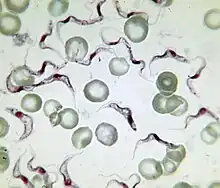Trypanosoma
Translingual

Trypomastigotes of Trypanosoma brucei, responsible for the African sleeping sickness
Etymology
Borrowed from New Latin, derived from Ancient Greek τρύπανον (trúpanon, “borer, auger”) + σῶμα (sôma, “body”), because of their corkscrew-like motion.
Proper noun
Trypanosoma n
- A taxonomic genus within the family Trypanosomatidae – kinetoplastids (class Kinetoplastea), a monophyletic group of unicellular parasitic flagellate protozoa having a spindle-shaped body with an undulating membrane on one side and a single flagellum, which infect a variety of hosts and cause various diseases, including the fatal sleeping sickness in humans.
Hypernyms
- (genus): Eukaryota - superkingdom; Protozoa - kingdom; Eozoa - subkingdom; Euglenozoa - infrakingdom; Euglenozoa - phylum; Kinetoplastea - class; Trypanosomatida - order; Trypanosomatidae - family
Hyponyms
- (genus): Duttonella, Herpetosoma, Megatrypanum, Nannomonas, Pycnomonas, Schizotrypanum, Trypanozoon - subgenera; Trypanosoma brucei, Trypanosoma cruzi, Trypanosoma equiperdum - selected species
Derived terms
Further reading
 Trypanosoma on Wikipedia.Wikipedia
Trypanosoma on Wikipedia.Wikipedia  Trypanosoma on Wikispecies.Wikispecies
Trypanosoma on Wikispecies.Wikispecies  Trypanosoma on Wikimedia Commons.Wikimedia Commons
Trypanosoma on Wikimedia Commons.Wikimedia Commons - Trypanosoma at Encyclopedia of Life
- Trypanosoma at National Center for Biotechnology Information
- Trypanosoma at World Register of Marine Species
German
Further reading
- “Trypanosoma” in Duden online
- “Trypanosoma” in Digitales Wörterbuch der deutschen Sprache
This article is issued from Wiktionary. The text is licensed under Creative Commons - Attribution - Sharealike. Additional terms may apply for the media files.